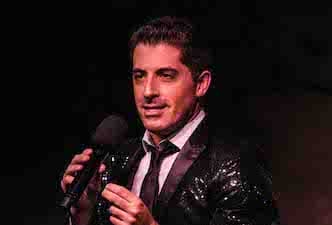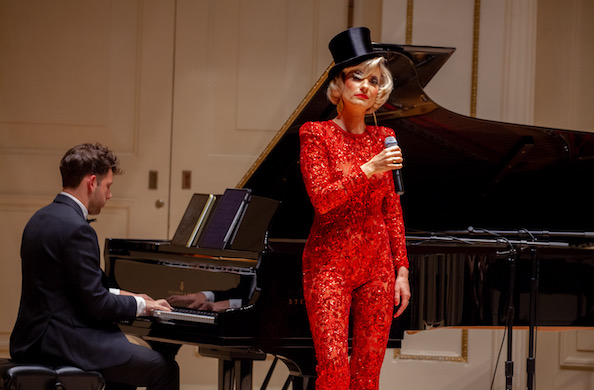Elvis at Café Carlyle? Singer Anthony Nunziata Blazes His Own Path
Also, at Weill Recital Hall, the German-born singer and entertainer Adrienne Haan performs ‘Tehorah’ in honor of the 75th anniversary of the founding of Israel.

Most young male singers that you’re likely to hear at upscale cabaret rooms such as the Carlyle or 54 Below will populate their programs with well-known show tunes and the occasional pop standard. Anthony Nunziata reverses that equation: For his Café Carlyle debut, he offered mostly power ballads, channeling Elvis Presley and Nat King Cole rather than Billy Bigelow and Henry Higgins. He talked about being immersed in 1980s and ’90s pop, but most of his material came from the early days of rock — even “I Only Have Eyes for You” was more indebted to the Flamingos than Busby Berkeley.
Mr. Nunziata is also a gifted songwriter, and interspersed some of his own songs throughout the evening, most effectively “Will You Be My Everyday” (a song that would sound great as a countermelody to Carole King’s “A Natural Woman”) and “I Found A Home.”
Accompanied by pianist and songwriting partner Jeff Franzel, Mr. Nunziata had the good sense to put his trust in his powerful baritone. He knows that high-caliber love songs are his forte, and wasn’t tempted to interrupt the flow with swingers (other than a very brief “Fly Me to the Moon” at the start) or comedy or patter songs.
The evening was essentially exactly what it should be: one ballad after another, all of which were tailored fittingly for the intimate space of the room, appropriately understated and personal. For the sake of variety, he occasionally built up to a respectable belt, but it was never overdone; he never took the obvious route of getting all “American Idol” on us, even though he clearly has the chops to do so.
Mr. Nunziata interspersed the songs with tales of his family, including of his twin brother Will Nunziata, who shared an act with him for a few years. He ended with the 1999 pop song “The Prayer,” echoing Andrea Bocelli, but in a far subtler performance. Mr. Nunziata then encored with “Somewhere” from “West Side Story,” which extended the reverent mood so effectively that it could have been titled “Another Prayer.”
***
In honor of the 75th anniversary of the founding of Israel, the German-born singer and entertainer Adrienne Haan performed “Tehorah” at Weill Recital Hall. Ms. Haan’s show had its debut there in 2015, and as before, she was accompanied by a piano, played this time by musical director Udi Gershuni, and a string quartet featuring violinists Leerone Hakami and Maya Lorenzen, violist Ella Bukszpan, and cellist Tamar Sagiv. (She has also recorded the program as a CD.)
“Tehorah” — the Hebrew word for “pure” — is a rough narrative of the Jewish experience covering the period from the end of World War I to the end of World War II, beginning in Weimar, Germany, concluding in the founding of Israel in 1948. In between, and in a most tasteful fashion, she also deals with the Holocaust. Ms. Haan tells the story singing in three languages, German, Yiddish, and Hebrew, with very spare but effective narration in English.

Ms. Haan took to the stage in a vibrant red sequin jumpsuit that at first seemed at odds with the solemnity of the program, but ultimately underscored how the Jewish experience is, in addition to everything else, both sensual and outspoken. The attire seemed especially appropriate for the Weimar-era material, which are primarily sexy and funny “kabaret” songs about the inadequacy of man.
To accommodate those of us who don’t speak any languages other than English, Ms. Haan provided a program book with English translations. This wasn’t much use, as the type was so small that nobody over 30 could read it. Still, the text proved unnecessary; Ms. Haan got the meaning across with her musicianship and body language, and the music itself.
Her opening number, as on the CD, is “Hagan Habil’adi (Exclusive Garden)” which communicates its point mostly nonverbally in any case. Thus even without the benefit of understanding the words, the meaning came across, and the story was moving and enlightening. Between the imagery of Ms. Haan herself and the overwhelming sound of the string quartet, it was a powerful and profound evening.
To Ms. Haan’s credit, she never came out and directly told us whether she is actually Jewish. We don’t really need to know, though if she isn’t, she seems to understand and communicate the Jewish experience more profoundly than many actual Jews. Besides which, on an occasion like this, the whole world becomes Jewish.

